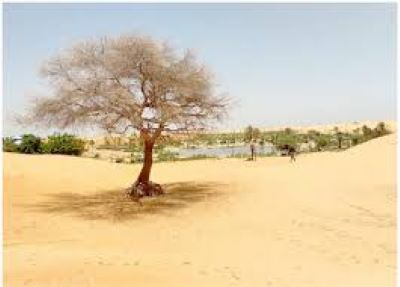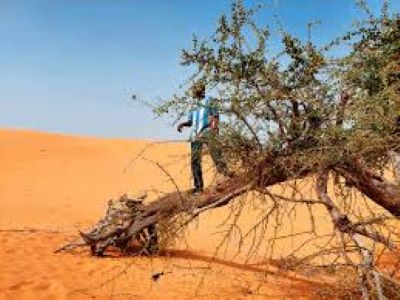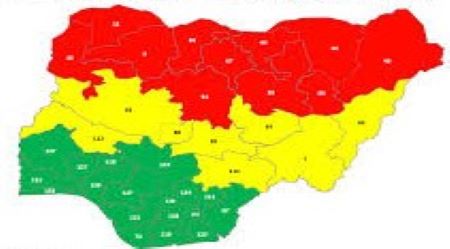Under the vast skies of Northwest and Northeast Nigeria, a troubling story unfolds in silence—a story that resonates with the heartbeats of millions who call these regions home. Eleven states, including Borno, Yobe, Jigawa, Kano, Katsina, Sokoto, Zamfara, Kebbi, Bauchi, Gombe, and Adamawa, are at the forefront of an escalating environmental catastrophe. The once-thriving landscape, teeming with life and vegetation, is being swallowed by the encroaching desert. The culprit? Deforestation, primarily fueled by the endless logging of trees for firewood—a common survival mechanism for many who rely on wood to cook their meals.
By Abdallah el-Kurebe
For generations, the trees have stood as silent sentinels, offering shelter and sustenance to the land. But today, with each fallen tree, the land loses more than just its green cover, thereby causing desertification. The protective shield that once held the soil together, retained moisture and regulated the climate is rapidly vanishing. The once-lush fields are turning into stretches of barren desert, with dunes creeping closer and closer. This cycle of destruction is not just an environmental issue; it strikes at the very core of survival for communities whose lives are intertwined with the land.
The human impact on deforestation: Stories of struggle and loss
Imagine standing on what was once fertile farmland, where farmers like Nasir Suleiman in Jigawa used to plant millet, sorghum, and maize to feed his family. Now, all that’s left is dry, cracked earth. “We used to harvest enough for the year,” Nazir recalls, wiping the sweat from his brow. “But now, the desert is taking everything. We cannot even grow enough to eat, let alone sell.”
Nazir’s story is not unique. Across these regions, farmers and herders face similar struggles as desertification tightens its grip. Livestock herders, like Shafa’atu Ahmadu from Sokoto, now travel twice the distance they used to in search of grazing land for their cattle. “I can’t remember the last time I saw lush grass,” she says. “The animals are getting weaker, and water sources are drying up.”

For the millions living in these areas, desertification is not a distant threat—it’s a daily reality. The Sahara Desert is slowly creeping southward, consuming the lands that once provided food, water, and shelter. Entire villages are at risk of being displaced as people abandon their homes in search of greener pastures or migrate to urban centers, swelling already overburdened cities. This mass migration puts immense pressure on the limited resources available in cities, leading to overcrowding, unemployment, and increased social tension.
A call to action: Why the government cannot wait on deforestation
The environmental degradation plaguing Northwest and Northeast Nigeria has far-reaching consequences that extend beyond the regions themselves. At the heart of the crisis lies a fragile ecosystem whose collapse threatens not just the local economy but also the nation’s stability. If left unchecked, the desertification of these states will undermine Nigeria’s food security, displace entire communities, and deepen the socio-economic challenges already faced by millions.
Yet, the Nigerian government’s response has been alarmingly slow. While the issues may seem distant to policymakers in Abuja, the reality is that inaction has dire consequences. Addressing desertification is not just about saving trees; it’s about protecting the livelihoods of millions of Nigerians who depend on the land. It’s about ensuring that children like Amamatu, who walk miles to fetch water from a dwindling stream, have a future where water and food are not scarce.
The cost of ignoring this crisis is immense. As productive land disappears, food prices rise, and hunger becomes widespread. The conflict between farmers and herders, already exacerbated by dwindling resources, could spiral further out of control. The longer the government waits, the more difficult it becomes to reverse the damage.

Policies for restoration: What needs to be done against deforestation
Nigeria needs an urgent, coordinated effort to halt the progression of desertification. This starts with restoring degraded land and stopping further deforestation. The Great Green Wall (GGW) initiative, an ambitious African project aimed at stopping the Sahara’s advance, offers hope. However, progress in Nigeria has been slow, with efforts stalling in many states. The government must now commit to planting more trees, restoring vegetation, and enforcing stricter environmental laws.
A crucial element in this fight is reducing the reliance on firewood and charcoal as the primary energy source in rural communities. The solution lies in providing access to alternative, clean energy sources. Solar-powered cookers and affordable clean stoves could ease the pressure on forests. Subsidizing cooking gas or investing in community biogas projects could also provide alternatives for families like those of Nazir and Shafa’atu whose survival depends on the forests they are inadvertently destroying.
At the same time, strong policies must be in place to stop illegal logging. Forests are being cut down at an alarming rate, and without proper enforcement, the cycle of deforestation will continue unchecked. Punitive measures for illegal loggers, combined with community-based forest management programs, would go a long way in preserving what is left of the forest.

Empowering communities: The heart of the solution
It is one thing to pass laws and policies, but it is quite another to ensure that those most affected are involved in implementing these solutions. Local communities are the front line in the battle against desertification, and they must be part of the solution. Educating communities on sustainable land use practices, such as agroforestry (which combines agriculture with tree planting), and providing training in water conservation techniques, can help protect the environment while boosting agricultural productivity.
Women, like Shafa’atu, who gather firewood for cooking, play a central role in this battle. Empowering them with access to cleaner energy alternatives and training them in sustainable practices will have far-reaching effects not just for their households but for the wider community. Additionally, youth should be engaged in reforestation efforts through community-led tree-planting programs that foster a sense of ownership over their environment.
Global support: A collaborative approach
Nigeria’s desertification crisis is not just a national issue; it is part of a broader environmental challenge faced by the entire Sahel region. International partnerships and funding are crucial to scaling up efforts to combat desertification. Organizations such as the United Nations and the Global Environment Facility (GEF) can offer both technical and financial assistance. However, the Nigerian government must be willing to prioritize these collaborations, ensuring that funds are effectively used for reforestation, land restoration, and community support programs.
Conclusion: A future in our hands
In the end, the fate of Northwest and Northeast Nigeria rests not just in the hands of government officials, but in all of us. Every tree cut down today is a future lost for someone like Ibrahim or Fatima. Every decision to act—or not to act—will shape the future of millions living on the frontline of desertification. But there is hope. By taking immediate and decisive action, the Nigerian government can halt the desert’s advance, restore degraded lands, and ensure that future generations inherit a land that is not just livable, but thriving.
The time to act is not tomorrow. It is today. The cost of inaction is far too great, and the lives hanging in the balance deserve more.


